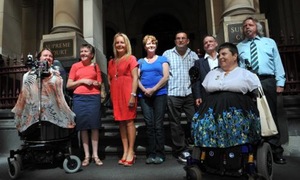
The British company that distributed and sold the drug thalidomide knew almost six months before it was pulled from the market that there were credible claims it caused terrible deformities and the deaths of infants, a new book reveals.
If Distillers had heeded warnings it received in June and July 1961, as many as 1,000 babies would not have been born with severe injuries such as missing limbs, and another 1,000 would not have died shortly after birth, the book says.
Silent Shock by lawyer Michael Magazanik appears to clear up a long-running dispute about when the company knew thalidomide, widely given to women as a cure for morning sickness between 1958 and 1961, was exceptionally dangerous.
The company has always claimed it halted the sale of the drug in November 1961 as soon as it and the drug’s manufacturer Grunenthal received information from Australia and Germany that it was causing serious deformities.
Magazanik was a lead lawyer in the Australian case of Lynette Rowe, who was born without arms or legs after her mother took the drug during pregnancy. In preparation for that case in 2012, Magazanik interviewed former workers at Distillers’ headquarters in Australia, including salesman Hubert Woodhouse, known as Woody.
Woodhouse signed an affidavit and agreed to video his evidence that revealed that the company’s most senior management in Australia had known there were strong reports of thalidomide’s danger in June 1961.
In that month, Australian obstetrician William McBride says he had called Distillers to warn them about three babies in his care that had been born with catastrophic injuries after their mothers had taken the drug during pregnancy. Distillers have claimed they never received that call or that he may have spoken to a junior staffer who ignored it. They took no action at the time, later claiming they were unaware of any concerns.
But Woodhouse told Magazanik that senior Distillers staff in Australia – including Bill Poole, who ran the business – were aware of McBride’s warnings through the second half of 1961. Despite this, they continued to aggressively market the drug as safe and effective and to lobby the Australian government to include it on the pharmaceutical benefits scheme, which subsidises drugs.
“I don’t know how Bill Poole found out about McBride’s concerns but he definitely knew about them,” Woodhouse told Magazanik. “Bill Poole was aware around the middle of 1961 of what McBride believed.”
Woodhouse said he often joined senior management for a whisky after work where McBride’s warnings were discussed.
“The conversations were sometimes lengthy and Poole especially expressed great concern at the possibility McBride was right,” Woodhouse said. “Poole believed, and stated, that the future of the business hinged on whether McBride was right or wrong.” He said Poole was aware of how serious the warnings were, telling him he was not to speak about McBride’s report to anyone.
It is not clear whether the Australian arm of the company passed on McBride’s concerns to the UK headquarters at the time, although Woodhouse had assumed they had. Yet Distillers backed Poole’s version of events that it had acted as quickly as possible as soon as warnings were raised. In November, McBride again reported that the drug was connected to deformities, as did German doctors, and it was pulled from sale.
Poole, who is dead, lied on an “industrial scale”, says Magazanik, to cover up Distillers’ knowledge of the drug’s dangers.
Lyn Rowe’s mother Wendy took thalidomide after McBride’s June warnings and would not have been born deformed if those reports had been acted upon more quickly. She received a multi-million dollar settlement in 2012 from Diageo, the UK drinks group which is the legacy owner of Distillers.
Because the trial did not go ahead, Woodhouse’s critical evidence was not made public at the time, but made an “enormous difference” to the claim, Magazanik told Guardian Australia. In 2013, Diageo settled a class action for $AU89m to pay compensation to 100 Australian and New Zealand victims.
“When apologists say that the whole thing was an unavoidable disaster – that’s rubbish. There were repeated opportunities to cut the death and injury toll short,” said Magazanik.
“For the first time we now know just how disgracefully the thalidomide drug companies behaved. Distillers’ top man in Australia sat on McBride’s shocking report for five months, leading to thousands of avoidable deaths and injuries worldwide.”
He said it took could courage and compassion for Woodhouse, who is in his 80s and is very ill, to come forward and tell what he knew.
Although Distillers had acted disgracefully, it was far from alone. “In Germany, Grunenthal and its staff got reports of malformations possibly linked to thalidomide in 1959, 1960 and 1961. It did nothing to investigate _ just kept selling more and more of the drug.”
About 10,000 babies worldwide were born without limbs because of thalidomide. Half of them died shortly after.
